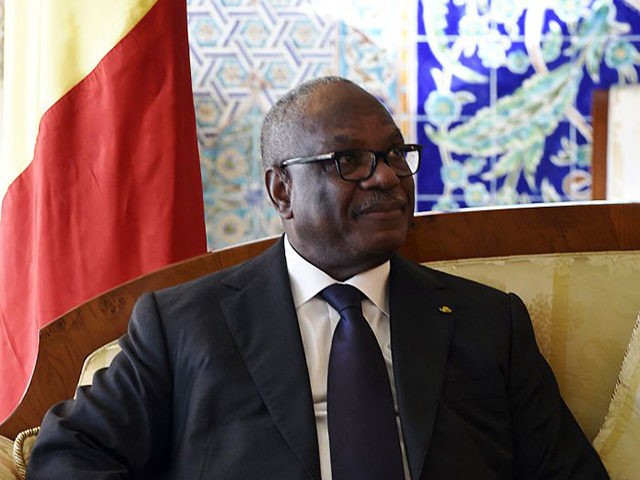Mali’s President Ibrahim Boubacar Keita resigned Tuesday after being held prisoner for a few hours, along with Prime Minister Boubou Cisse, by a force of mutinous soldiers.
Keita took office in 2013 promising that the days of mutinies, coups, and juntas were over, but in the end, he was overthrown by one of the swiftest coups in recent history.
The president was supported by Western governments, most notably France, which has struggled against tribalism and the rise of Islamic extremism in the Sahel region around the Sahara Desert for years. When Keita took office, France moved counter-terrorism forces into the region while the European Union worked on training the Malian army into a more disciplined and formidable fighting force. Jihadi organizations, including the Islamic State and al-Qaeda, continued building their strength in the Sahel throughout the past decade.
Political unrest in Mali this year included accusations that French troops stationed in Mali were engaging in “rowdy behavior” and indulging in “excesses” in the red-light districts of Mali’s capital Bamako, as Malian Ambassador to France Toumani Djime Diallo put it.
“It makes people afraid, it makes tongues wag,” Diallo said in February. French military and government officials denied the accusations of misbehavior.
Keita was re-elected to a second term in 2018, but allegations of corruption and incompetence dogged his administration, and he found a potent populist adversary in Muslim cleric Mahmoud Dicko. Dicko rallied gigantic crowds in the streets despite the coronavirus pandemic, beginning in Bamako and spreading to other cities. Keita’s officials found it necessary to negotiate with Dicko even before they tried working out a deal with their elected political opponents.
Dicko is seen as an Islamic “conservative” and mystic — among other positions, he views homosexuality as a disease Mali caught from contact with the decadent West — but not a hardline fundamentalist or jihadi. He faulted Keita for allowing too much Western influence on Malian culture, and for doing a poor job of negotiating with the Sahel jihadi groups.
Meanwhile, the secular opposition to Keita railed against him for allowing the economy to collapse and doing a poor job of holding terrorists at bay. The opposition first demanded Keita cede some power to a “unity government,” then began demanding his resignation after botched parliamentary elections, rising allegations of corruption, the suspicious disappearance of an opposition leader, a teachers’ strike, and photos of Keita’s son partying on a yacht while the economy collapsed.
When he was elected, Keita pledged that “Kati will no longer scare Bamako,” a reference to the Kati military base outside the capital city from which the previous coup occurred. Seven years later, another coup boiled out of the Kati base.
Mutinous soldiers drove through Bamako on Tuesday firing their stolen weapons in the air, rolled through cheering crowds of anti-government protesters, set the justice ministry on fire, took Keita and his prime minister hostage, and demanded the entire government resign. Keita complied with their demands a few hours later, after his captors ignored demands from the African Union and United Nations to unconditionally release him.
“Today, certain parts of the military have decided that intervention was necessary. Do I really have a choice? Because I do not wish blood to be shed,” Keita said in a televised statement announcing his resignation.
Keita declared he was additionally dissolving the government and parliament, as demanded by the mutineers.
“May Allah help and bless Mali. I don’t feel any hatred,” he concluded.
Man-on-the-street interviews in Bamako revealed a mixture of surprise at the speed of the coup and apathy over Keita’s fate. “We did not expect this at all. It was a surprise for everyone. But since yesterday morning, in any case the population had abandoned the president,” one Bamako resident told Reuters.
On the other hand, most of the international and intra-African community condemned the coup. The West African umbrella organization ECOWAS effectively blockaded Mali, the European Union declared the coup “can in no way be a response to the deep sociopolitical crisis that has hit Mali for several months,” and counter-terrorist agencies braced for the awful security situation in the Sahel to get even worse.
“We are following with concern the development of the situation today in Mali. The US opposes any unconstitutional change of government, whether by those on the streets or by the defense and security forces,” said U.S. special envoy Dr. J. Peter Pham on Tuesday.
The next step for the coup plotters is uncertain. Leaders of the mutinous troops insisted they would hold elections and transition to a civilian government after a “reasonable delay,” but they also set up a “National Committee for the Salvation of the People” that looks a good deal like a junta.
Bloomberg News judged it unlikely that ECOWAS will be able to force Keita back into office or accept a transitional government led by anyone in his political orbit. Dicko’s populist Islamist movement, which calls itself M5-RFP or the “June 5 Movement,” will probably demand a seat at the table when any new government is formed. France and the rest of the European Union will not relish the idea of sinking into a quagmire by attempting to impose a civilian government.

COMMENTS
Please let us know if you're having issues with commenting.